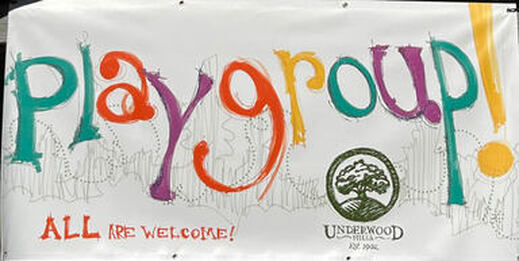Play Group, Committees
|
Play Group is one of the many things that makes our neighborhood wonderful. Play Group brings parents and children together for fun, friendship and seasonal celebrations. Play Group has created countless friendships among parents and children.
Email [email protected] for more information, or visit the Underwood Hills Nextdoor page. What Does Underwood Hills Play Group Do?
How Can I Get Involved with Play Group? Join us! During the school year, meet us at the Park. Play Group dates are announced on the Underwood Hills Nextdoor page, but you’ll frequently find folks gathered at the Park (from 4:00–6:00pm on Fridays when the weather is nice). We ask that each family contribute $20.00 toward the seasonal parties. How Did Underwood Hills Play Group Start? Underwood Hills Play Group began in 1996 when Liz Jacobs and a few other new mothers began meeting informally. Back then, there were not many children in the neighborhood, and Play Group was small. Today, there are over 100 families who participate. When we first began, we met at the home of a different member each week. Our numbers outgrew a single house, so we now meet at Underwood Park where the children can use the play equipment and enjoy fresh air. Email [email protected] for more information. |
Traffic Committee was formed to help address various traffic issues affecting our neighborhood. The committee, which consists of neighborhood volunteers, works with other neighborhood groups, our City Council Member’s office, the Office of Transportation and the Department of Public Works, among others, to try to improve conditions for both motorists and pedestrians in our area.
We appreciate as many volunteers and diverse voices as possible in order to come up with solutions that are beneficial to the entire neighborhood. If you’d like to get involved with the UHNA Traffic Committee, please send an email to our Traffic and Safety Committee Chair. Planning Committee meets on the first Tuesday of each month that there is business to review. We typically gather at the Starbucks on Howell Mill, but that location is subject to change depending upon the nature of our business. The Planning Committee hears issues that come before the NPU within the Underwood Hills boundaries and makes a recommendation to the UHNA membership, as appropriate. Our Planning Committee is chaired by Ben Hudgins. The NPU representative for Underwood Hills is Eva Cary Nason. If you have a zoning or license matter within Underwood Hills that will require you to go before the NPU, please email us to schedule your appearance before the Planning Committee at our next general meeting and send all applicable documents and plans.
The Atlanta Neighborhood Planning Unit (NPU) system was instituted during Mayor Maynard Jackson’s administration. At that time, Underwood Hills (which then included the area which later became Berkeley Park) was grouped together to become NPU-D with communities primarily to the west, including Riverside, Whittier Mill, Bolton, Hills Park and Blandtown. The meeting date for NPU-D is always the 4th Tuesday of each month at 7:30 p.m. The meeting place is the Agape Center at 2210 Marietta Blvd. Atlanta’s 230 neighborhoods are grouped into 24 neighborhood planning units. In NPU-D each neighborhood has a representative and an alternate chosen in caucus by that neighborhood’s attendees at the NPU’s designated yearly election meeting. One of the major items of business for an NPU is to consider and vote on zoning issues that come to the neighborhoods comprising the NPU. The city requires that such issues be handled by the NPU before they come to the city’s Public Hearing Boards. The NPUs review and respond to proposals about all kinds of city functions: transportation, parks, recreation, economic development, public safety, human services and environmental protection. The NPU process gives the city a sounding board for citizen reaction. It also allows citizens to initiate ideas and assist the city in developing plans that best meet the needs of their communities. |

